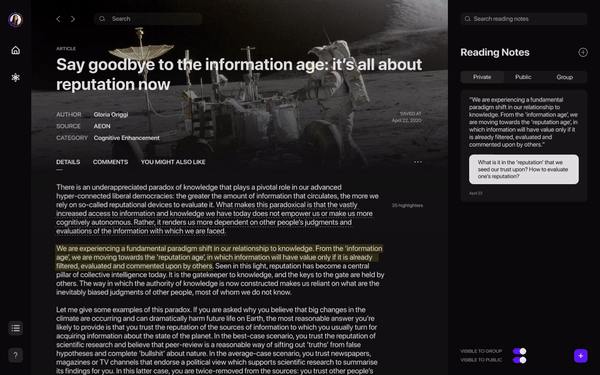Fugue
A social learning platform that helps students harvest, digest and make sense of information in the age of digital.
Learning is easy in the digital age. Is it really?
Digital technologies have drastically changed the way we access, consume and engage with information. It seems all so easy with the development of internet: if you are curious about a new topic, just google it.
But how true is it, if we just make the claim that learning has become so easy nowadays? Well, it depends on how “learning“ is defined, and what outcomes are expected as results. If to scope it down to a process of transforming new information to knowledge, there are, in fact, different cognitive layers required to complete a learning activity.
Source: Building a Second Brain by Michael D. Gershon
The challenge of learning in the digital age
To have a deeper understanding of how digital tools and mediums are impacting learning, I started research focusing on college students, whose learning activities are the most effort-demanding and time-consuming amongst all others.
For college students, learning is an everyday endeavor that occupies a significant time sourcing, perceiving and digesting new information. In an increasingly virtual environment like today, learning through digital tools and mediums has become an integrated part of students’ life.
But how effectively are the existing tools and mediums supporting student’s learning activities and outcomes? To answer this question, I interviewed with 25 graduate students living in the Boston Area to explore the common issues and challenges they’ve been facing with digital learning.
Lost in the research results
“It’s a total mess every time I try to do some research about my class project. Because I don’t know what really worths my time reading, I always ended up with dozens of tabs opening and I was so afraid of closing any of them in case there were hidden gems that I haven’t got to it yet.”
- Hane, 25, Master in Design Engineering
Difficult to examine the relevancy & quality
“I honestly don’t know if the search results google gets me are gold, or just trash. But I have to treat them all equally serious until I have a better sense of the topic I’m trying to learn, which could be a big waste of time sometimes.”
- Cath, 27, MBA
Bookmark/saving does not capture thinking
“When I save something, there was actually an entire thinking process behind it. But the existing bookmark system does not reflect any of my thinking process. It was why I think the existing bookmark system is so broken. It should not just be a place to store ideas/information, it should help me retrieve ideas.“
- Dona, 31, JD
Files saved all over the place
“It’s never easy to find what I’ve saved. Sometimes I save notes that inspired by contents online to One Drive. For articles people sent to me, those are left in email or whatsapp…. It’s just everywhere.
- Dan, 25, MS in Education
Synthesize research insights
The insights gathered from interviews surprised me. Before doing the research, I was unaware of how common some of the challenges were shared among students, despite the fact that interview participants were intentionally selected from a wide variety of academic backgrounds. Through affinity diagramming, I discovered three key areas that students found most frustrated about in their online learning activities.
Identifying & Verifying
Students who rely heavily on doing research via online resources found themselves incompetent of identifying & verifying the quality of information. They expressed concerns about wasting time on fake/outdated contents.
Interpreting & Distilling
Students often found that doing research online make them easily feel overwhelmed (“too much to comprehend if you don’t have the prior knowledge, too little to take away when you can’t comprehend”).
Organizing & Categorizing
“The existing bookmarking system is so broken.” Students found no sufficient ways to capture the thinking process while organizing contents they found online. Many also expressed their frustrations of retrieving those digital assets.
The opportunity of making learning better
Before interviewing with students, I spoke with domain experts and school professors who spent their lives on researching and enhancing learning. Many of them expressed deep concerns regarding the digital mediums that students are using for consuming information. In a research paper that I was recommended, the author skillfully unpacked the cognitive process of transforming information to knowledge to a digram (shown below). Surprisingly, many of the areas the author identified were also what students found most frustrated about in learning with digital tools & mediums.
Many of the existing digital tools, such as note taking apps and in-browser bookmarking systems, are only tackling one out of many essential areas that are required to complete a learning task. However, if we take learning as a repetitive process of transforming information to knowledge, to facilitate a better learning outcome, we will need to tackle each of the challenges from a system perspective instead of disassembling them.
“…how might we help students form a better process of transforming information to knowledge?”
Introducing Fugue
The deluge of information and digital mediums in the modern time have presented both opportunities and challenges for students’ everyday learning.
In an all-in-one way, Fugues helps facilitate a reiterative learning process including identifying, capturing, verifying, interpreting, organizing and categorizing new pieces of information to knowledge, in a collaborative, social way.
Capture your thinking as you read
As part of the product offering, Fugue can be integrated as a Chrome browser extension to allow in-browser annotation and thoughts-capturing. In addition to bookmarking the entire page, users can annotate any media on the page, make private notes right in the browser, and synchronize back to Fugue App cloud base in no time.
Physically separated, intellectually connected
In a desktop App, everything users captured on the web will be synchronized and reformatted for a better reading experience. Users can find public notes and comments shared by other people to quickly locate and distill insights. The group feature will also allow users to invite peers to form a new discussion and learn from each other.
Connect with an intellectual, collective brain
Learning from a reputational path is the key to a successful learning outcome. Based on user collected contents, Fugue connects individual learners with a collective brain. Users can find recommended contents based on their previous heavy readings & community data. They can also follow their fellow students and professors to identify valuable contents.
Your knowledge, all in one place
Fugue serves as an all-in-one space for users learning footprints. It tracks and saves in-browser readings, notes, and project files for users to access anytime, anywhere.













